Panama Canal Authority
The Panama Canal Authority (Spanish: Autoridad del Canal de Panamá, or ACP) is a state-owned entity responsible for managing, operating, and maintaining the Panama Canal. It was established in 1997 by the Panamanian government following the signing of the Torrijos-Carter Treaties with the United States, which led to the transfer of control of the canal from the U.S. to Panama at the end of 1999.
Here are some key points about the Panama Canal Authority:
Organizational Structure:
- Governance: The ACP is governed by an 11-member board of directors. Board members are appointed in a manner designed to ensure both governmental oversight and independent professional management.
- Leadership: The organization's day-to-day operations are managed by an Administrator and Deputy Administrator, who are appointed by the Board.
Responsibilities:
- Operations: The ACP is tasked with ensuring the smooth and safe navigation of vessels through the Panama Canal, which is one of the most significant maritime routes in the world.
- Maintenance and Development: The authority is responsible for maintaining and improving the canal's infrastructure. This includes routine maintenance, as well as large-scale projects such as the Panama Canal Expansion, also known as the Third Set of Locks project which was completed in 2016. This expanded the canal’s capacity by allowing the passage of larger "New Panamax" ships.
- Economic Role: Besides facilitating global maritime trade, the canal is a crucial revenue generator for Panama. Tolls and related services provide substantial income for the country.
Economic Impact:
- Revenue: The ACP generates its revenue primarily through tolls charged to vessels transiting the canal. They also earn from various services such as tug assistance, line handling, pilotage, and provisioning.
- National Contribution: Revenues from the canal contribute significantly to Panama's national economy, supporting various public services and economic development initiatives.
Environmental and Social Responsibilities:
- Sustainability: The ACP engages in sustainability efforts aimed at protecting the canal's watershed and reducing the environmental impact of its operations. This includes water conservation initiatives and efforts to reduce emissions from ships.
- Community Engagement: The ACP works on community development projects and educational programs to benefit the communities around the canal.
Strategic Importance:
- Global Trade: The Panama Canal is a critical conduit for international maritime trade, significantly shortening the maritime journey between the Atlantic and Pacific Oceans. This strategic importance has only increased with the canal’s expansion to accommodate larger vessels.
By effectively managing this vital waterway, the Panama Canal Authority plays a crucial role not only in Panama's economy but also in facilitating global commerce.
Services
Panama Canal Authority News
Dr. Ricaurte Takes Office as Panama Canal Administrator
Dr. Ricaurte Vásquez Morales was sworn-in during a ceremony held at the Panama Canal Administration Building in Panama City, becoming the fourth Panamanian Administrator…
Panama Canal: Advisory to Shipping
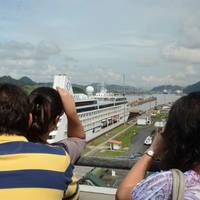
All Shipping Agents, Owners, and Operators advised as to Scheduled Culvert Maintenance at Gatun Locks.Beginning at 0600 hours on Monday, August 26, 2019, until 0600 hours on Friday, September 6, 2019 (10 days), the center wall culvert of Gatun Locks will be out of service for scheduled maintenance. During this culvert outage, both lanes will remain in service, but due to the slower filling and emptying of the chambers…
Fitch Affirms Panama Canal 'A' Investment Grade
For the fourth consecutive year, Fitch Ratings has affirmed the Panama Canal's 'A' investment grade rating with a stable outlook for its long-term issuer default…
Ships from Venezuela can still transit Panama Canal
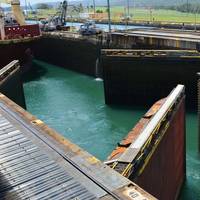
The Panama Canal will allow vessels coming from Venezuela to transit the waterway provided they present the necessary paperwork, the canal authority's chief said on Wednesday, suggesting a new round of U.S. sanctions on the South American country may not make any difference to canal traffic.President Donald Trump's administration last week issued an executive order freezing all Venezuelan government assets in the United States. Shortly thereafter, U.S.
Panama Canal starts Speed Limits to Protect Whales

Starting August 1 and until November 30, 2019, the Panama Canal will promote the implementation of the International Maritime Organization’s (IMO) annual recommendations on speed and maritime transit aimed at protecting cetaceans, which include whales, dolphins and other large aquatic mammals, during their nearby seasonal migration.With these measures, ships should proceed at a speed of not more than 10 knots in specified areas.
ICS Weighs in on Proposed Panama Canal Tolls
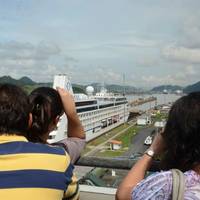
Global Shipping Industry Delivers Comments to Official Consultation on Proposed Modifications to Panama Canal Tolls.The Panama Canal Authority (ACP) is conducting a public consultation on a proposal to adjust the Panama Canal tolls for containerships, vehicle carriers, dry bulk carriers, tankers, chemical carriers, LPG and LNG vessels, passenger vessels and small vessels. The proposed new toll charges are anticipated to enter into effect on 1 January 2020…
Panama Canal, UN Join Forces on Climate Action
The Panama Canal and UN Environment signed a cooperation agreement today to join efforts on sustainable development and combatting climate change.Signed by the Administrator…
Panama Canal Hearing on Tolls Structure
The Panama Canal Authority (ACP) held Tuesday a public hearing on the proposed modifications of its toll structure which culminated the period for receiving inquiries…
Panama Canal to Modify Tolls Structure
The Panama Canal published a proposal to modify its current tolls structure for the dry bulk, passenger, containership and vehicle carrier and RoRo segments, as well as tankers…
Panama Canal Closer to a Carbon Neutral Future
The Panama Canal Authority announced enhancements to its industry-leading Green Connection Environmental Recognition Program.The award-winning initiative encourages…
Largest Boxship Ever Transits Panama Canal
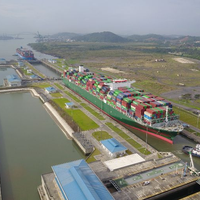
Today, the Panama Canal completed a trial transit of Evergreen’s Triton, the largest vessel in dimension and container cargo capacity to pass through the Expanded Canal since it opened in June 2016.The Neopanamax containership Triton, which has a Total TEU Allowance (TTA) of 15,313, a 20-row beam of 51.2 meters and a length of 369 meters, transited northbound from the Pacific to the Atlantic Ocean.Similar to the milestone Q-Flex transit completed on May 12…
Triton Makes Record Transit Through Panama
The Panama Canal completed a trial transit of Evergreen’s Triton, the largest vessel in dimension and container cargo capacity to pass through the Expanded Canal…
Panama Canal Expansion Allows More NGL Transists
In June 2016, the Panama Canal Authority, the body that operates the Panama Canal, opened a third set of locks that facilitated transit of larger ships, the first…
6,000th Neopanamax Transit at Panama Canal
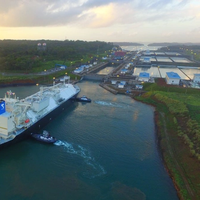
The Panama Canal welcomed its 6,000th Neopanamax vessel through the Expanded Canal, underscoring the route’s ability to accommodate the highly-dynamic liquefied natural gas (LNG) segment, which first transited the waterway following the inauguration of the Expanded Canal less than three years ago.The LNG vessel Energy Liberty completed the milestone transit today travelling southbound from the Atlantic to the Pacific Ocean.
Moody's Upgrades Panama Canal Rating
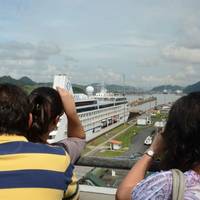
Moody’s Investors Service upgraded the 20-year $450 million Senior Unsecured Bonds issued by the Panama Canal Authority (ACP) to A1 from A2, with a stable outlook, based on the waterway's strong performance since the expansion's inauguration.Moody's noted that the Expanded Canal has increased overall tonnage and attracted new market segments, contributing to the waterway's strong performance. According to Moody's…
Panama Canal Appoints New Administrator
The Panama Canal Board of Directors announced the appointment of Ricaurte Vasquez as the next Panama Canal Administrator.According to a press note from the artificial…
Moody's Rated Panama Canal with Stable Outlook
Moody's Investors Service reaffirmed the Panama Canal Authority's (ACP) A2 long-term rating with a stable outlook, based on its distinctive position as an infrastructure…
Brazil’s Itaqui Port and Panama Canal Sign MOU
The Panama Canal has signed a memorandum of understanding with the Port of Itaqui to promote the shipment of grains and other cargoes in the commercial route from…
Panama Canal Sets Record Annual Cargo Tonnage
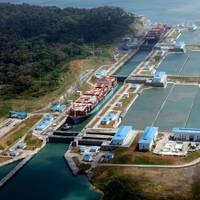
The Panama Canal closed its 2018 fiscal year with a record tonnage of 442.1 million Panama Canal tons (PC/UMS), which represents a 9.5 percent increase from the previous year, the Panama Canal Authority reports.With this tonnage, the Panama Canal surpasses the cargo projections of 429.4 million PC/UMS tons for FY 2018, as well as the 403.8 million PC/UMS tons registered in FY 2017."The Panama Canal continues to exceed our expectations…
Panama Canal to Receive 234 Cruise Ships this Season
The Panama Canal announced that it expects to receive approximately 234 cruise ships through the Panamax and Neopanamax Locks during the upcoming 2018-2019 cruise season.The first transit was on Oct.






